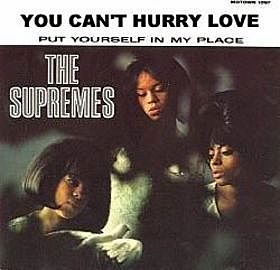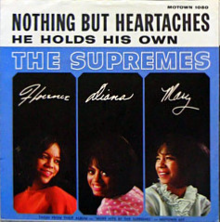"Someday We'll Be Together" is a song written by Johnny Bristol, Jackey Beavers, and Harvey Fuqua. It was the last of twelve American number-one pop singles for Diana Ross & the Supremes on the Motown label. Although it was released as the final Supremes song featuring Diana Ross, who left the group for a solo career in January 1970, it was recorded as Ross' first solo single and Supremes members Mary Wilson and Cindy Birdsong do not sing on the recording. Both appear on the B-side, "He's My Sunny Boy".

"Stop! In the Name of Love" is a 1965 song recorded by the Supremes for the Motown label.

"Reflections" is a 1967 song recorded by American soul music group The Supremes for the Motown label. The single release was the first Supremes record credited to "Diana Ross and the Supremes", and the song was one of the last Motown hits to be written and produced by Holland–Dozier–Holland before they left the label.

"Baby Love" is a song by the American music group the Supremes from their second studio album, Where Did Our Love Go. It was written and produced by Motown's main production team Holland–Dozier–Holland and was released on September 17, 1964.

"Come See About Me" is a 1964 song recorded by the Supremes for the Motown label. The track opens with a fade-in, marking one of the first times the technique had been used on a studio recording.

"Back in My Arms Again" is a 1965 song recorded by the Supremes for the Motown label.

"I Hear a Symphony" is a 1965 song recorded by the Supremes for the Motown label.

"You Can't Hurry Love" is a 1966 song originally recorded by the Supremes on the Motown label. It was released on July 25, 1966 as the second single from their studio album The Supremes A' Go-Go (1966).

"Love Is Here and Now You're Gone" is a 1967 song recorded by the Supremes for the Motown label.

More Hits by The Supremes is the sixth studio album by Motown singing group the Supremes, released in 1965. The album includes two number-one hits: "Stop! In the Name of Love" and "Back in My Arms Again", as well as the Top 20 single "Nothing but Heartaches".

"My World Is Empty Without You" is a 1965 song recorded and released as a single by the Supremes for the Motown label.

"Love Is Like an Itching in My Heart" is a 1966 song recorded by the Supremes for the Motown label.

"The Happening" is a 1967 song recorded by Motown artists The Supremes. It served as the theme song of the 1967 Columbia Pictures film The Happening, and was released as a single by Motown at the time of the film's release that spring. While the movie flopped, the song peaked at number 1 on the Billboard Hot 100 pop singles chart in May, becoming The Supremes' tenth number 1 single in the United States, peaking in the top 10 on the UK Singles Chart at number 6, and in the top 5 in the Australian Pop Chart and in the Dutch Pop Chart.

"Forever Came Today" is a 1968 song written and produced by the Motown collective of Holland–Dozier–Holland, and was first made into a hit as a single for Diana Ross & the Supremes in early 1968. A disco version of the song was released as a single seven years later by Motown group the Jackson 5.

"When the Lovelight Starts Shining Through His Eyes" is a song written by Holland–Dozier–Holland and recorded in 1963 by the Motown singing group the Supremes. It is notable as the Supremes' first Billboard Hot 100 Top 40 recording, following seven previous singles between January 1961 and September 1963 which failed to enter the Top 40. The single is also notable as the first Supremes single written and produced by Holland–Dozier–Holland, who had previously created hits for Martha and the Vandellas and Mary Wells.

"In and Out of Love" is a 1967 song recorded by The Supremes for the Motown label. It was the second single issued with the group's new billing of Diana Ross & the Supremes, the penultimate Supremes single written and produced by Motown production team Holland–Dozier–Holland, and the last single to feature the vocals of original member Florence Ballard.

"I'm Gonna Let My Heart Do the Walking" is a disco-styled soul single composed by the Holland brothers Eddie and Brian, members of the former Holland–Dozier–Holland team and was released as a single by Motown vocal group The Supremes in 1976 on the Motown label. It was the first single since "Your Heart Belongs to Me" in 1962 to feature four Supremes. It is also notable for being the last top forty single the group would score before they disbanded in 1977.

"Some Things You Never Get Used To" is a song released in 1968 by Diana Ross & the Supremes on the Motown label. The single stalled for three weeks at number 30 on the U.S. Billboard pop chart in July 1968. It became the lowest-charting Supremes single since 1963 and became the catalyst for Berry Gordy to revamp songwriting for The Supremes since the loss of Motown's premier production team Holland–Dozier–Holland, which Gordy had assigned as the group's sole producers after the success of "When the Lovelight Starts Shining Through His Eyes."

"No Matter What Sign You Are" is a song released for Diana Ross & the Supremes by the Motown label.

"Where Did Our Love Go" is a 1964 song recorded by American music group the Supremes for the Motown label.



















